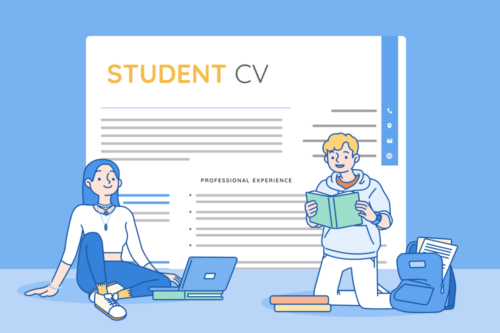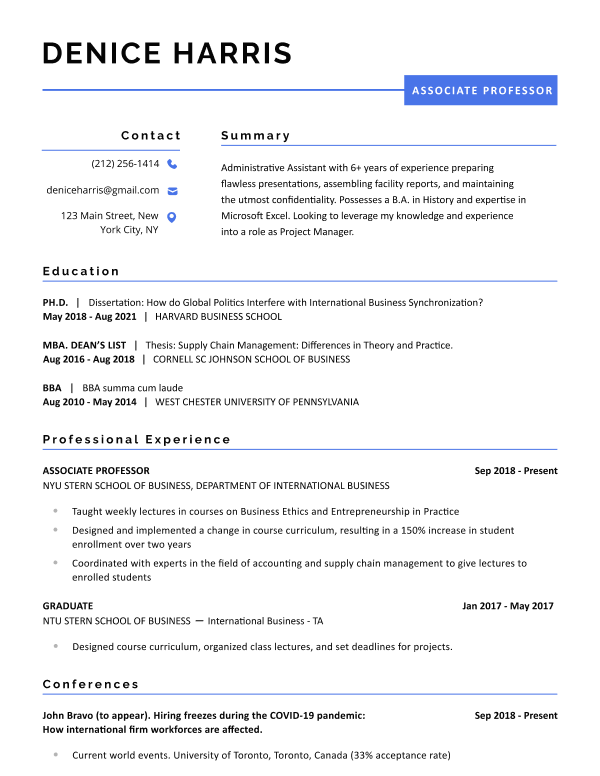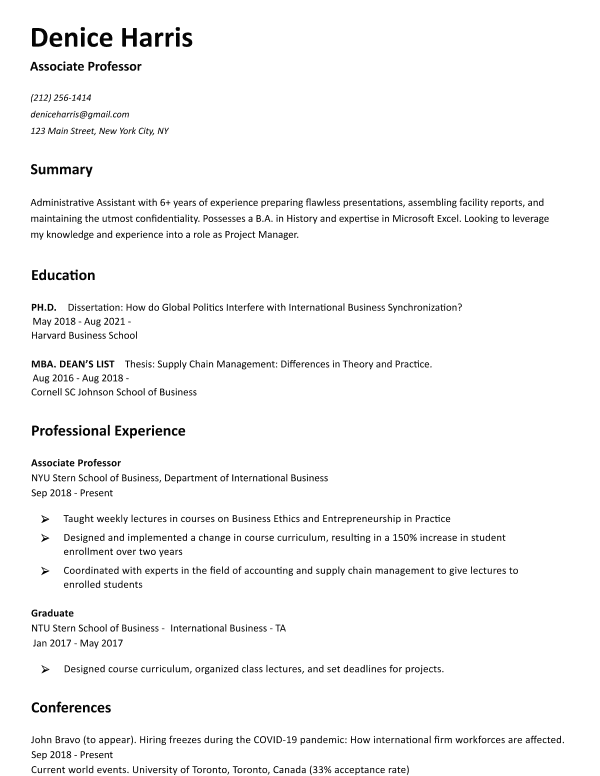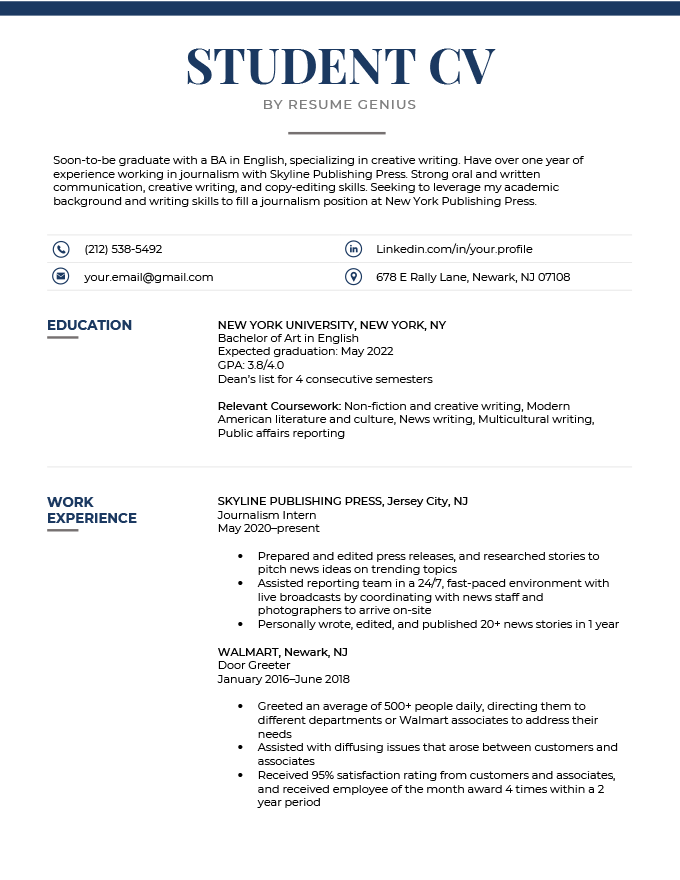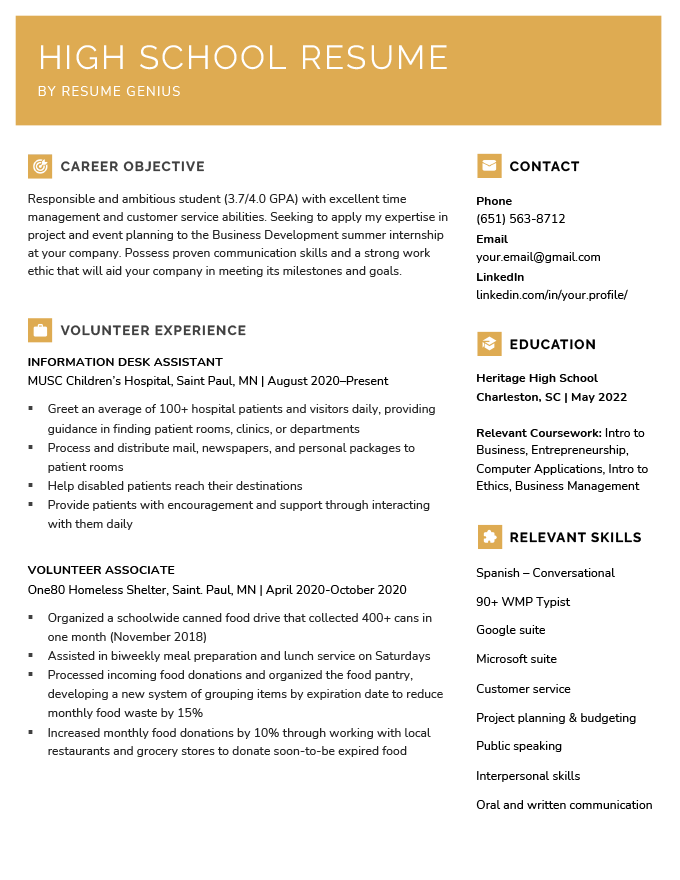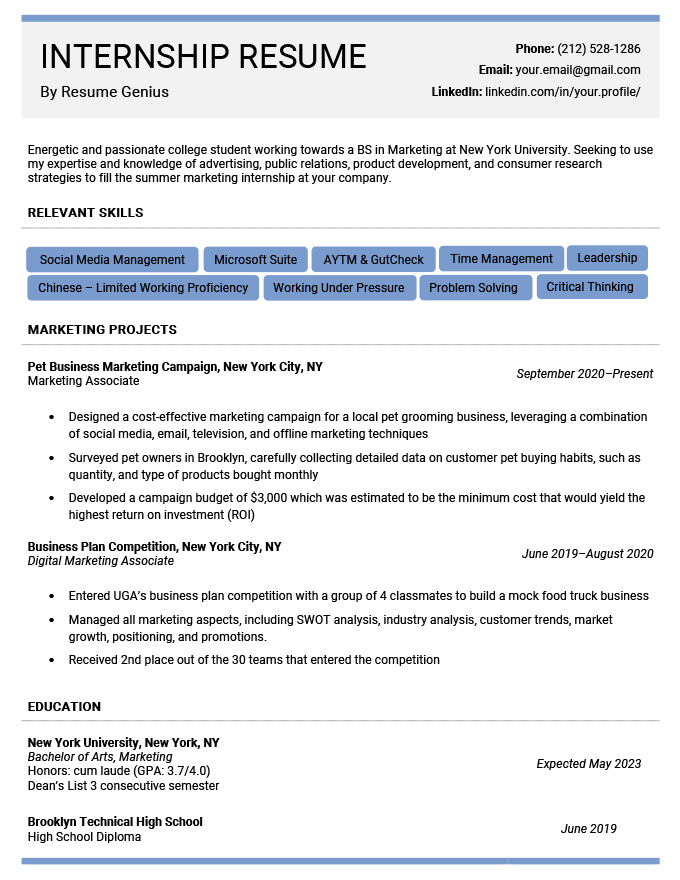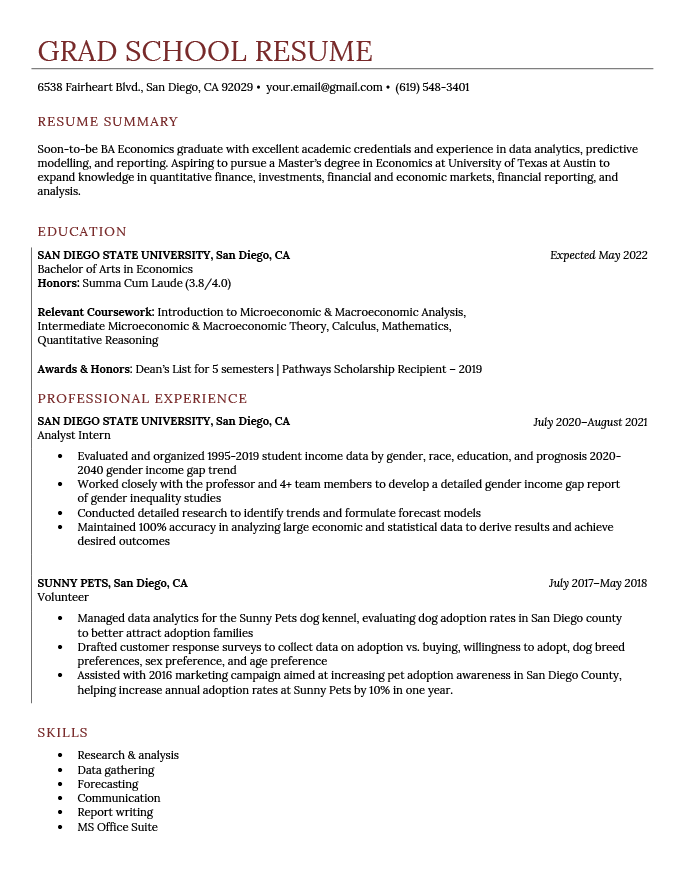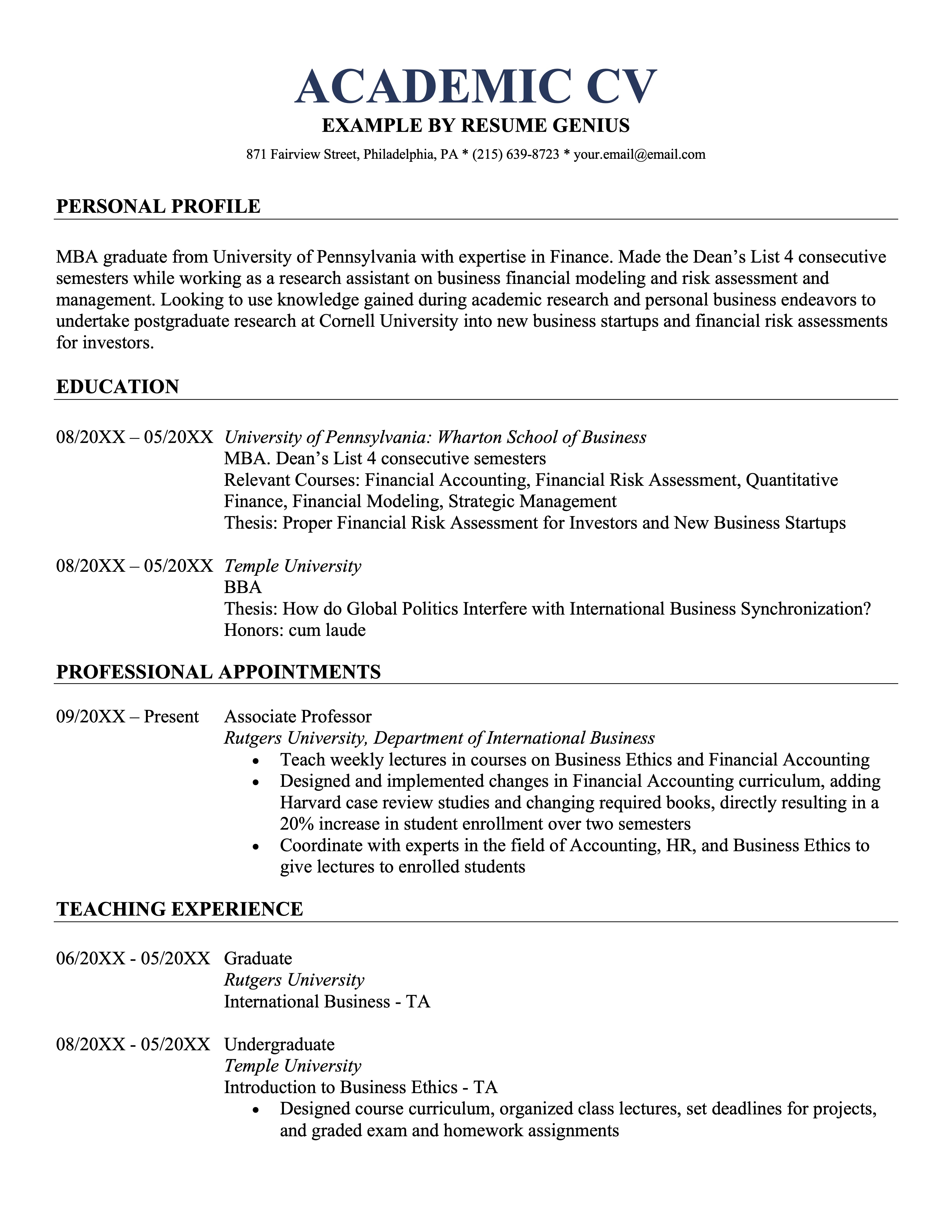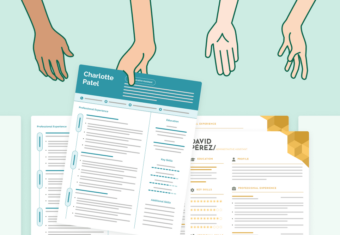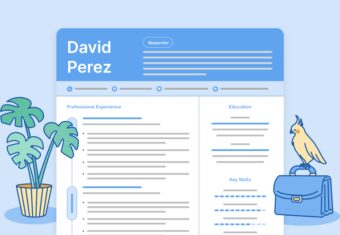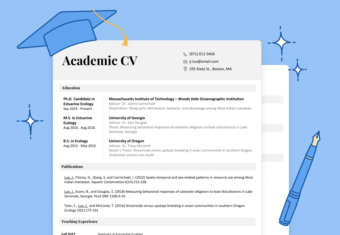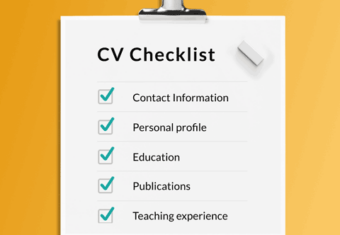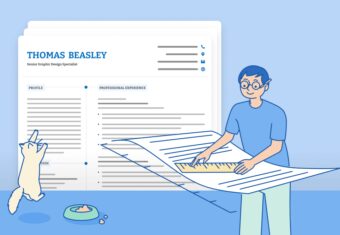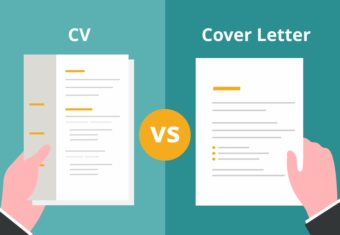Below, we’ve included several CV examples, a template, and writing tips for students, each useful for different situations a job-hunting student may encounter while going to school.
Our free-to-use cv builder can make you a cv in as little as 5 minutes. Just pick the template you want, and our software will format everything for you.
Student CV example
You’re graduating from college soon, and you’ll need to put your university degree to work and get a great position within your field.
However, hiring managers will want you to submit a great student CV with your job application, complete with your academic background, qualifications, and skills to best assess how qualified you are.
Not sure when to use a CV or resume? The main difference between the two is that CVs are used to apply for academic positions while resumes are used for jobs outside of academia.
Here’s a student CV example for a soon-to-be BA English graduate:
High school student resume example
As a high school student, you’re likely applying for your first job, which means you also have little to no work experience.
However, because you’re still a student, many employers won’t expect you to have a lot of experience or professional skills yet. If you can write a great high school resume for your job application, it should be enough to at least earn you an interview for entry-level roles.
Here’s an example of a high school student resume where the writer highlights the skills they do have, and makes the most of their extremely limited experience:
Internship resume example
As a student, it’s ideal to have relevant internship experience in your field before you graduate, as employers ultimately want a candidate that has work experience so that they can trust the individual will be prepared to excel in the position they’re applying for.
If you know which company or firm you want to work at, having previous internship experience at that organization can also help you transition to full-time employment once you’ve graduated.
However, because many students recognize the value of internships in preparing them for the professional world, competition for the best ones is fierce. You’ll need to write a clear, targeted resume for your internship that displays your academic background, expertise, and skills if you want a hiring manager to call you in for an interview.
Here’s an example of an well-written internship resume:
Grad school resume example
Getting your master’s degree can be a great way to elevate your resume and career by providing you additional skills and knowledge, and it can provide fantastic networking opportunities.
But a lot of graduate programs have strict vetting processes. You’ll need a grad school resume that showcases your most notable, relevant accomplishments as an undergraduate to impress the admissions committee and secure a spot in your ideal master’s or PhD program.
Here’s an example of a grad school resume that earned its writer admission into their chosen graduate school:
Academic CV example
Last, we have an academic CV. Academic CVs are used by students in higher education to apply for researching or teaching positions.
Academic CVs are different from other student CVs because they require more information and are thus usually longer than other application documents.
Regardless of length, however, teaching and research positions are hard to come by, often with several similarly-qualified students applying for a single position.
To help you get a sense of what a strong academic CV looks like, here’s a video breaking down exactly how to write one that’ll get you hired in a professional or educational setting:
Make sure you know what to include in your CV and that your qualifications and skills are accurately displayed by following the formatting of our example below:
Student CV template
Here’s a Student CV template you can use for a variety of scenarios when applying as a student:
FIRST AND LAST NAME
Email | Phone | Address | Linkedin
2. Professional Summary
Soon-to-be graduate with [degree] and [# of years] experience. Strong [set of relevant skills]. Seeking to leverage my [academic background and expertise] to fill [job position] and help achieve [Company’s Name]’s goals.
3. Education
Degree Name / Major
University, Location | Start Date – End
- List your GPA (if 3.5 and above)
- Display any honors you have, such as Dean’s list
- Include any relevant coursework that pertains to the job you’re applying to
4. Relevant Experience
Most Recent Title or Position
Employer Name / Location / Start Year – End Year
- Include a bulleted list of relevant responsibilities and achievements
- Quantify your experience by adding numbers to give the hiring manager a better grasp of your experience
- Be as specific as possible. Use software, tools, or programs names
Previous Title or Position
Employer Name / Location / Start Year – End Year
- Make sure to use the past tense of verbs if you’re no longer in this position
- Make sure to include at least three bullet points when detailing experience
- Use action verbs, instead of phrases such as “responsible for” and “duties included”
5. Skills
- Include a bulleted list of skills you’ve gained from college, jobs, volunteer, or internship work
- Consider skills that will be important to have regarding the job you’re applying for
- Be sure to include a mix of both hard and soft skills
3 tips for writing a CV as a student
Finding a job after university can be difficult, especially if you lack the qualifications and skills necessary for the job you want.
However, you can still impress hiring managers and convey that you’re motivated to learn and the right person for the job with your CV.
To help you get started writing your CV, we’ve included 3 tips for undergraduate job seekers below.
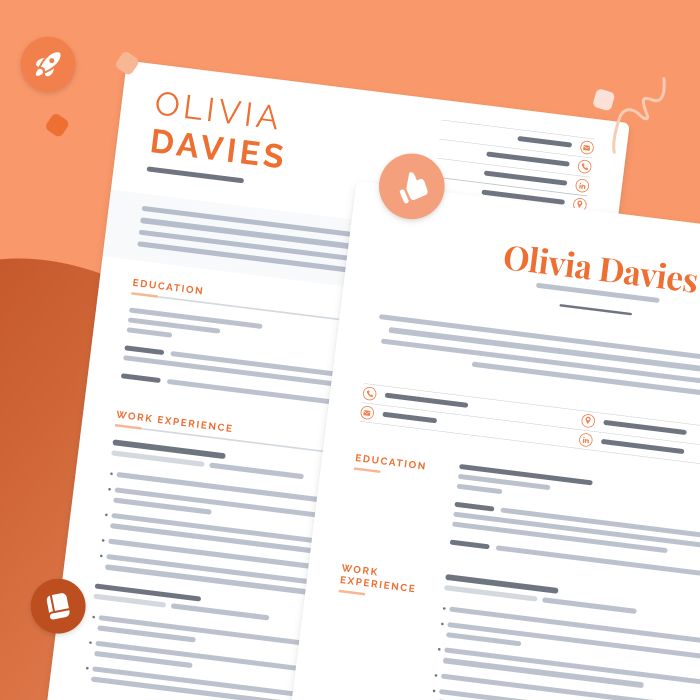
Need to make a CV? The best way to start is by downloading one of our free CV templates and filling it in with your information.
1. Expand upon your education section
Because you’re a recent graduate, you’ll likely be relying on your academic background to land a job.
So ensure you expand upon your resume’s education section by listing any details that are relevant to the job and help you stand out among similarly-qualified applicants.
For example, show you’re a high-achiever by putting cum laude and Dean’s list, your GPA (3.5 and above), and listing awards or scholarships you earned during school. Additionally, make sure you list relevant coursework if it pertains to the position.
Here’s a great example of an education section for a journalist applicant:
Bachelor of Art in English
New York University, New York, NY | 2017 – 2021
Honors: Summa Cum Laude (3.8/4.0)
Dean’s list for 4 consecutive semesters
Relevant Coursework:
- Non-fiction and creative writing, Modern American literature and culture, News writing, Multicultural writing, Public affairs reporting
2. Use a “relevant experience” section
Since you’re in school, employers won’t expect you to have a lot of experience and qualifications under your belt. But if you have relevant work experience it can make all the difference when searching for a job after graduation.
Instead of using a work experience section, create a “relevant experience section” and only list professional experience directly correlated with the position you’re applying for. This experience may be gathered in a variety of other ways, such as volunteer work or extracurricular activities.
Quality over quantity: Early-career academics often feel the pressure to amass as many publications or teaching experiences as possible. Instead, focus on fewer but significant contributions that you can speak passionately about.
Dr. Andrew Stapleton of Academia Insider
If you have other work experience from when you were younger, such as working in fast food or as a cashier, simply omit those jobs because they’re probably not relevant to the job you want out of college (but if they are, you should list them).
If your previous job titles aren’t directly correlated or relevant with the position you’re applying for, you may have relevant duties you were charged with. For example, a cashier applying for a finance position after graduating could list their ability to calculate money and conduct financial forecasting for the next shift.
3. Focus on your transferable skills
Regardless of your previous experience, you likely have transferable skills that you can list on your undergraduate CV, especially if you’re an older student going to school with a career change in mind.
Transferable skills: Highlight any non-academic experience that has equipped you with skills relevant to research, teaching, or service.
Dr. Andrew Stapleton of Academia Insider
Focus on these hard and soft skills when writing your CV. Whether gained at a previous company or during school, they can all help you come off as more qualified in a job application.
Additionally, you can list skills you developed not only in the classroom but also doing extracurricular activities or performing volunteer work.
Here’s a list of skills our entry-level journalist candidate honed in college and on-the-job:
Skills
- Oral and written communication
- Research
- Analytical skills
- Networking
- Public speaking
- Interpersonal skills
If you want to highlight more of your experiences, try writing a cover letter. Unsure what the difference is between a CV vs a cover letter? A cover letter is a one-page document that accompanies your CV and expands upon your transferable skills, character, and work history.
Click to rate this article
4.3 Average rating


